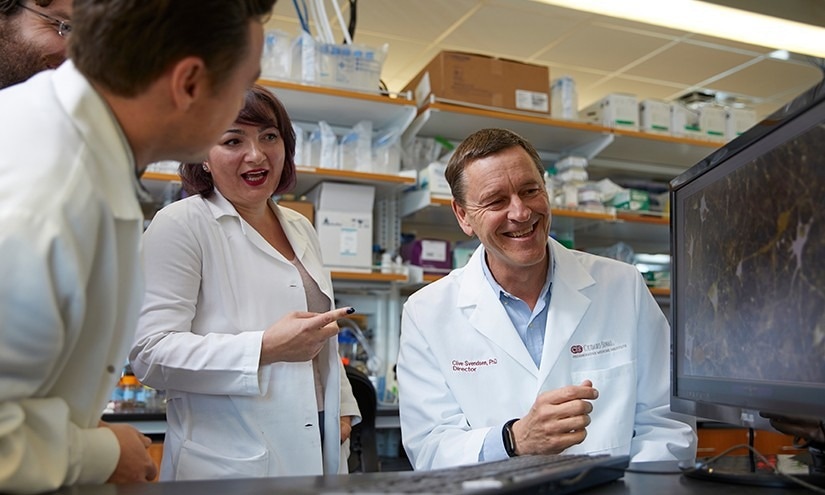The Drs Ayeez and Shelena Lalji & Family ALS Endowed Award for Innovative Healing was given to Clive Svendsen, PhD, a pioneer in regenerative medicine, for his significant contributions to the field of amyotrophic lateral sclerosis (AL) at Massachusetts General Hospital’s Sean M. Healey & AMG Center for ALS.
 Clive Svendsen, PhD, and his laboratory at Cedars-Sinai were honored for their critical innovative discoveries in stem cell biology and the development of an integrated growth factor (GDNF) and stem cell therapy for ALS that can potentially protect diseased motor neurons in the spinal cord of patients with ALS. Image Credit: Cedars-Sinai
Clive Svendsen, PhD, and his laboratory at Cedars-Sinai were honored for their critical innovative discoveries in stem cell biology and the development of an integrated growth factor (GDNF) and stem cell therapy for ALS that can potentially protect diseased motor neurons in the spinal cord of patients with ALS. Image Credit: Cedars-Sinai
Svendsen and his team’s groundbreaking scientific studies on the repair and regeneration of ALS, a fatal neurological disorder, have earned them a prestigious international award.
It is always an honor to have our research recognized for our dedication in finding new ways to treat such a devastating disease. The award highlights the excitement in the field for these innovative new trials. An amazing team of clinicians and scientists and, critically, the patients with ALS all helped to make them possible.”
Clive Svendsen, PhD, Professor, Biomedical Sciences and Executive Director, Board of Governors Regenerative Medicine Institute, Cedars-Sinai
Svendsen and his Cedars-Sinai lab were recognized for their groundbreaking research in stem cell biology and the creation of an integrated stem cell and growth factor therapy for ALS that might be able to preserve diseased motor neurons in the spinal cord of ALS patients.
The first portion of the award recognized a novel investigational stem cell and gene therapy strategy that makes use of stem cells that were first developed in Svendsen’s lab to produce the GDNF-producing protein.
Motor neurons—the cells that transmit signals from the brain and spinal cord to muscles enabling movement—can be helped to survive by the cells in combination with this protein.
The delivery of this combined treatment is safe in humans, according to the findings of the first trial of its kind, which were published earlier this year in Nature Medicine.
Dr Svendsen and his team’s discoveries represent novel approaches, laying the groundwork for new and improved therapies for ALS, clearing a path to slowing down or halting the nervous system damage this characterizes this terrible disease.”
Jeffrey Golden, MD, Director, Burns and Allen Research Institute, Cedars-Sinai
For their work on Answer ALS, a cloud-based data resource created to aid in the identification of new subtypes of the disease based on the patient's own stem cells, Svendsen and Jeffrey Rothstein, MD, PhD, professor of Neurology at Johns Hopkins Medicine, are jointly recognized with this honor.
The Cedars-Sinai Biomanufacturing Center is producing 1,000 stem cell lines from ALS patients and converting them into the motor neurons that die in ALS as part of a collaborative effort that was featured in Nature Neuroscience.
These were subsequently thoroughly analyzed, and the information was made available to researchers around the world to better understand the disease. In this massive data set, they hope to identify specific subtypes of ALS that eventually lead to new drug targets and new treatments for this debilitating condition.
The Drs Ayeez and Shelena Lalji & Family ALS Endowed Award for Innovative Healing was founded in Dr Ayeez Lalji’s honor, who has bravely and resolutely battled ALS since 2017. The Lalji ALS Foundation’s objective is to raise awareness and foster innovation to aid in the search for an ALS cure.
The 33rd International Symposium on ALS/MND, an event devoted to the study of ALS and motor neuron disease, presented Svendsen with the award on December 9th, 2022.
Source:
Journal references:
- Baloh, R. H., et al. (2022). Transplantation of human neural progenitor cells secreting GDNF into the spinal cord of patients with ALS: a phase 1/2a trial. Nature Medicine. doi.org/10.1038/s41591-022-01956-3
- Baxi, E. G., et al. (2022). Answer ALS, a large-scale resource for sporadic and familial ALS combining clinical and multi-omics data from induced pluripotent cell lines. Nature Neuroscience. doi.org/10.1038/s41593-021-01006-0